homepage news
Dr. Virginia Uribe, Project 10 Founder, pioneer for LGBT youth, dies at 85
The Fairfax High School science teacher founded Project 10
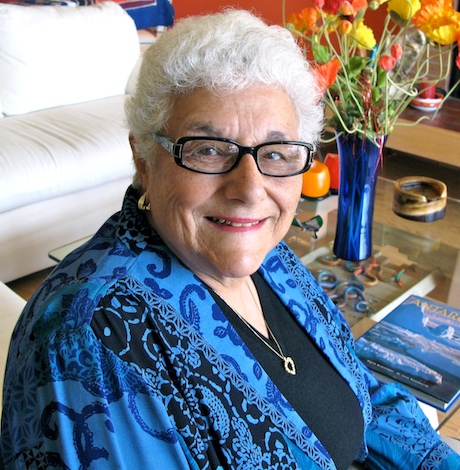
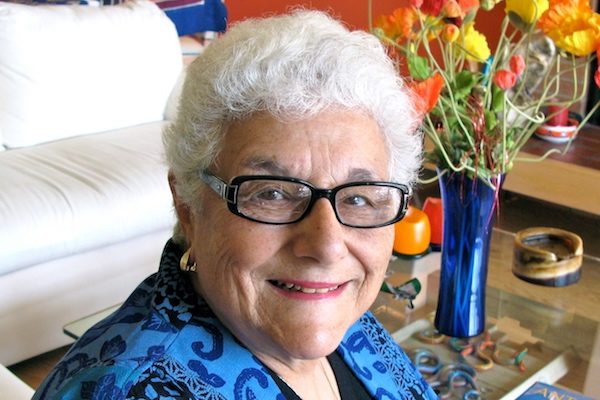
Virginia Uribe’s life includes a forgotten epic battle over LGBT youth between the strong lesbian science teacher and her Religious Right nemesis, Lou Sheldon.
Before ACT UP and Queer Nation, there was another LGBT empowerment organization that courageously defied the old socially accepted mythology of gay people as sexual deviants and predators: Project 10. Founded by kindly but determined and focused Fairfax High School science teacher and counselor Dr. Virginia Uribe, Project 10 became the basis for GLSEN, Gay-Straight Alliances, and pro-equality youth public policies, student curriculum and progressive changing attitudes toward LGBT youth.
Dr. Uribe died late Saturday afternoon, March 30, of multiple health issues at Garden Crest Rehabilitation Center in Silver Lake where she was receiving hospice care, according to her wife, Gail Rolf. The two married in 2008 but were together for 30 years this May. Uribe was 85.
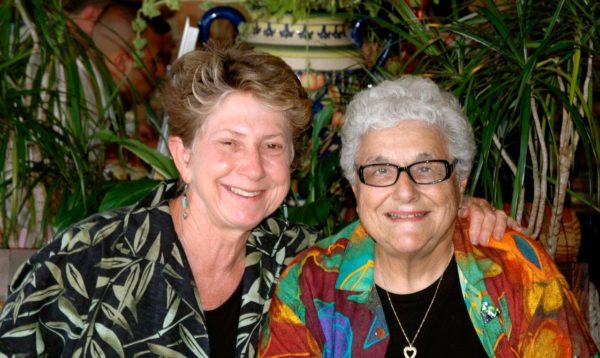
Project 10 was named after the Alfred Kinsey sliding scale of human sexual behavior in 1948 that posited that roughly 10 percent of the population identified as bisexual or homosexual. Deeply rooted in the concept of liberty and justice for all, Uribe saw the desperate need of an unrecognized minority at risk because of unscientific societal norms and prejudices. In fact, the LGBT program started because bullied gay students saw how she responded to black students.
“In the 1960s, way before Project 10, the school had no black faculty and the black students at Fairfax High School sought her out and asked if she would be their club advisor because of her principles and giving voice to those who have no voice,” Rolf tells the Los Angeles Blade. “So the gay kids went to her for the same reason, not knowing that, in fact, she was a lesbian.
“A young African American student was attacked by other students for presumably being gay and the students at Fairfax who were LGBT had a sort of ‘Rosa Parks’ moment where they said enough is enough,” Rolf continues. “She was not out at the time but she realized that she needed to come out so she became one of the first educators in the Los Angeles Unified School District to come out – because of her work with Project 10.”
The launch of Project 10 in September 1984 as a “little informal rap group at lunchtime” that became an LAUSD pilot project was not only historic but groundbreaking in challenging existing attitudes.
“Every young person has a right to a sense of self-respect and dignity,” Uribe told the LA Times in 1984. “In public education we serve the needs of all our students. Some are gay and lesbian and we need to serve them too. We’re supposed to be teaching them to live in an increasingly diverse society. This shouldn’t be a place where prejudice is fostered. It’s where discrimination should be fought.”
LGBT students would act out, winding up with poor academic records, disciplinary problems, and after conflicts with their teachers, parents and other students, would too often drop out and wind up on the streets. Closeted LGBT students would suffer shame, depression and anxiety in silence, often resulting in mental and emotion issues such as alcohol and drug abuse.
Project 10 provided LGBT and questioning students a supportive safe space to talk about their issues, learn about themselves and develop a sense of empowerment and self-worth. If they stayed in school and graduated, they had a better shot at a productive life.
“This is not an advocacy program,” Uribe told the LA Times in 1985. “It is an attempt to relieve some of the pressures on gay kids so that they can go on to graduate instead of dropping out.”
The Times described Uribe, who had been teaching for roughly 30 years, as “an avowed lesbian health teacher and counselor who founded the project.”
“Not all of them are kids you would immediately classify as definitely gay or lesbian,” said Uribe, who started thinking about gay youth while getting her Ph.D in psychology. “I’ve talked with some kids who are confused about their identities, but were afraid to tell anyone else about their feelings.”
Uribe started meeting quietly with students in her windowless classroom during her lunch period. “They had no one else they could talk to,” Uribe said. “Their parents either didn’t know, or else did know, but wouldn’t listen. They obviously couldn’t talk with the straight kids. And a lot of these kids were very intelligent, but their grades didn’t show it.”
But Uribe needed more time. “These kids were in danger of dropping out and I couldn’t help them with just a few minutes a day,” she told The Times. She approached Fairfax Principal Dr. Warren L. Steinberg, who signed on.
“It’s another way to help a segment of society that needs attention,” Steinberg told The Times. “We have programs at Fairfax for deaf students, for orthopedically handicapped, for immigrant students, for the gifted, for the educably retarded. Why not gay students?”
Two LAUSD Board members also jumped on—Alan Gershman and Jackie Goldberg, who would become a significant friend and supporter as LAUSD Board Chair.
“I thought there would be some resistance,” Uribe said, “but everyone’s been supportive.”
LAUSD originally provided $6,000 of funding but Uribe, who was only paid her regular teacher’s salary, turned to the new City of West Hollywood with its large gay community for a $1,800 grant for books and other materials.
“It’s the high school where our students go,” said West Hollywood Councilmember Helen Albert, a former teacher. “And it helps us by making sure gay students graduate instead of ending up on our streets.”
After the LA Times stories, people started sending in contributions to help support the project, Rolf says, so in 1986, they created Friends of Project 10 (FOP10), the nonprofit arm of Project 10, which Rolf ran as Education Director. The non-profit helped fund a myriad of programs Project 10 developed, including the annual LGBT Prom, an annual Models of Pride youth conference, the Models of Excellence Scholarship Competition, a Youth Lobby Day, and the Make It Real Project.
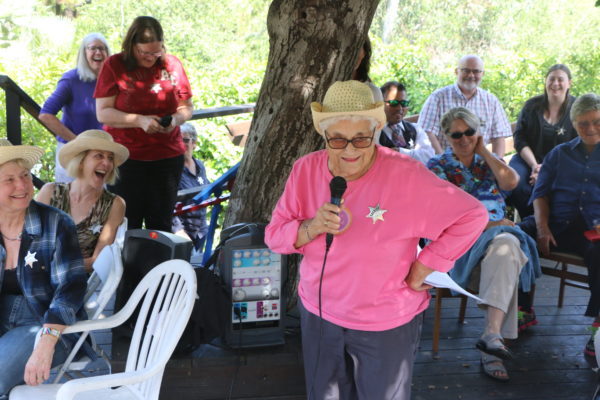
But founding and sustaining Project 10 was no easy feat, transforming Uribe into a fierce “David” fighting the emboldened Religious Right, with Traditional Values head Lou Sheldon as her staunchest “Goliath” nemesis.
In fact, Project 10 was a perfect foil for the Religious Right, fitting squarely into the “no promo homo” mold, a term coined by attorney Nan Hunter to describe the 1978 Briggs Initiative that would have allowed the firing of any public school teacher or school official found “promoting” homosexuality. Sheldon was involved in pushing the Briggs initiative through his California Defend Our Children, chaired by State Sen. John Briggs. After the initiative failed, Sheldon attached himself to the merger of the New Right with the Religious Right after evangelicals and fundamentalist Christians took credit for Republican Ronald Reagan winning the White House in 1980.
Sheldon admired political Christian televangelist Pat Robertson and launched the Traditional Values Coalition as a grassroots Christian lobbying group in Anaheim, where televangelists were making millions. As AIDS in the 80s began taking the lives of gay men, Sheldon called homosexuality a “deathstyle” and claimed gays were child molesters recruiting children as part of the real “homosexual agenda.”
Sheldon grew increasingly part of a network of anti-gay Religious Right groups such as Rev. Jerry Falwell’s Moral Majority, James Dobson’s Focus on the Family, Family Research Institute, Phyllis Schlafly’s Eagle Forum and other so-called “pro-family” groups with sophisticated mailers and computer networking. The anti-gay groups also became proficient in developing “victimhood” as a useful tool. For instance, Dr. Paul Cameron’s membership was dropped by the American Psychological Association in 1983 “for a violation of the Preamble to the Ethical Principles of Psychologists”—and he fought back by immediately becoming an “expert” on homosexuality and an AIDS consultant to Sheldon’s friend and ally, California Assemblymember William Dannemeyer. The Sheldon- Dannemeyer relationship would endure after the politician was elected to Congress. Dannemeyer wrote a whole book on the gays-recruit-kids-“homosexual agenda” called “Shadow in the Land.”
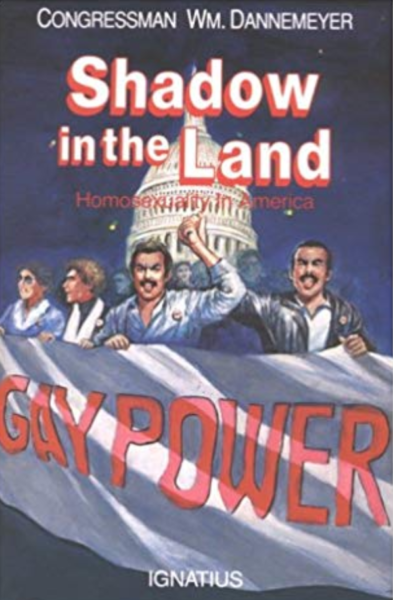
In 1984, a promotional national newsletter for the Religious Roundtable’s Family Forum III said the agenda included “important moral issues such as: the economic survival of the family, parents’ rights in education, the homosexual movement, personal charity, child pornography, and abortion.”
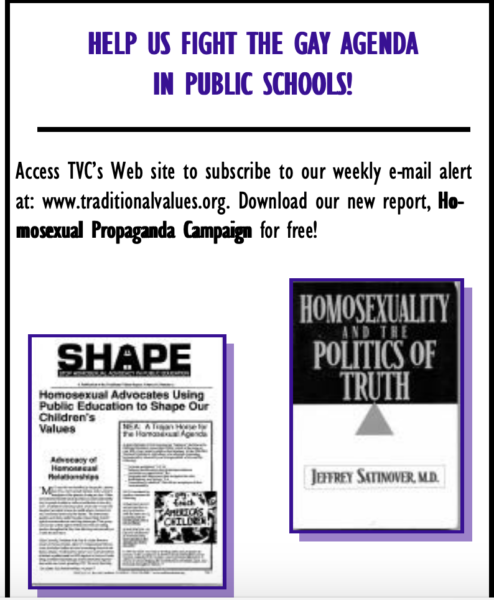
That year, Uribe founded Project 10, and soon after, Sheldon founded SHAPE (Stop Homosexual Advocacy in Public Education) at TVC. “Project 10 is clearly a recruitment program,” Sheldon told The Times. “It advocates for young people the homosexual life style. This is an absolute one-sided perspective. Why should taxpayers’ dollars support only one life style?”
He added: “Project 10 says you are born this way (a homosexual) and this is the way you are. That’s false information. It’s not conclusive that (homosexuality) is genetic. Homosexuality is only an underdeveloped stage of heterosexuality.”
Meanwhile, Virginia Uribe’s network was friends, teachers and supporters, many of whom were fighting for their lives on the AIDS front, as well. It took courage during the AIDS crisis and the Reagan administration to promote Project 10 as an LGBT dropout and suicide prevention program—and to spread the project to other schools, providing workshops for teachers and administrators on how to help LGBT students, how to stop the use of anti-gay words and behavior, and how to encourage parental participation at a time when Sheldon was working to elect anti-gay school board members who advocated for abstinence-only sex education and parental rights, not “special rights” for gays.
Uribe and friends advocated for honest sex education and condom distribution as AIDS prevention at a time when many were still afraid to share breathing space with a person with HIV/AIDS and were writing their fears into law. In 1986 and 1988, Sheldon endorsed far right extremist Lyndon LaRouche’s initiatives to quarantine for people with AIDS, which Sheldon dubbed “cities of refuge.”
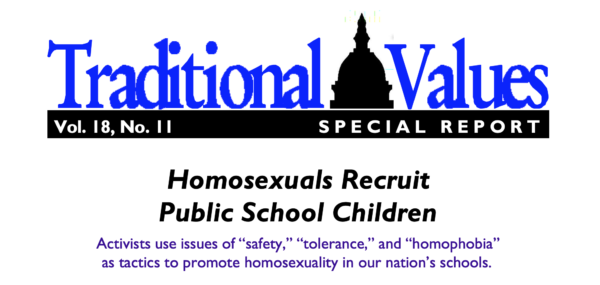
Sheldon used Uribe and Project 10 to build his bona fides with his Religious Right friends. In one TVC Special Report, Sheldon cited “reparative therapy” cult leader Dr. Joseph Nicolosi, founder of the Los Angeles-based NARTH:
“I believe it is a profound mistake to encourage adolescents with homosexual feelings to identify themselves as “gay” — and thus to make a sexual lifestyle decision with long-term and potentially deadly implications. Yet that is precisely the goal of Project 10 and similar pro-gay programs, which are being instituted in scores of public high schools across the country.”
“Project 10 is founded on the highly dubious assumption that there are “gay” youth who must be supported as gays. This ignores the formative factors behind homosexuality. The adolescent is torn by intense sexual and romantic feelings. At the same time, he is very unsure of his personal identity. These adolescent years serve as a transitional phase when affectionate, emotional and identification needs are eroticized. Compulsive, even addictive, sexual patterns can be formed during youth. Later in adult life, if this same person attempts to pursue a heterosexual lifestyle, he will find the transition very difficult. He already labeled himself “gay,” and will have established deep seated sexual behavior patterns.”
But by 1989, Uribe’s Project 10 in Room 308 had expanded to almost 600 counselors, nurses, teachers and school psychologists via workshops she conducted throughout LAUSD, according to The Times, with backing from more than 20 local and state teacher associations and youth groups.
“[LGBT youth] have to monitor everything they say, play it straight with friends and parents,” and be silent about their feelings, Uribe said – but in Project 10 they can be free.
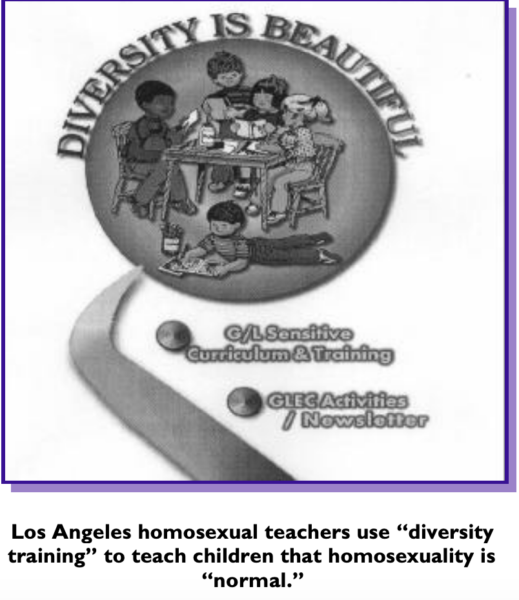
In 1988 and 1989, Uribe faced off with Sheldon and Catholic Archbishop Roger Mahony, who called Project 10 “a camouflaged method to legitimize homosexuality” and urged thousands of the faithful to protest the program.
In March 1988, conservative Republican Marian La Follette led the GOP caucus in voting to withhold new funds from LAUSD until it killed Project 10. District Supt. Leonard Britton and the LAUSD school board said no—they supported Uribe.
In June 1988, about 100 supporters and foes of Project 10 turned out for a boisterous booing and cheering LAUSD forum over the program.
“I’m sorry there’s an opposition,” Uribe said, “because, as part of a public school system, I feel that our commitment to equality extends to all children, including our lesbian and gay children.” LA City Councilmember Zev Yaroslavsky and out Municipal Judge Rand Schrader agreed.
Sheldon led a bunch of ministers against it, to no avail.
Students, meanwhile, praised Project 10. “I’ve had books thrown at me, I’ve had food thrown at me, I hear the word faggot 55,000 times a day,” said a 17-year-old Fairfax student, who asked The Times not to identify him.
“I just want to make it through my teen years,” said Regina, 17, who came out to her mother “because I couldn’t live a lie anymore. I wanted to be up front and truthful and honest about my feelings, but it just made matters worse.”
She was forced out of the home and wound up living with another young lesbian friend. Project 10 saved her—but she wanted the straight world to know that “I am not a child molester, I am not sex crazy and that I do not look at other girls that way when we dress in the locker room.”
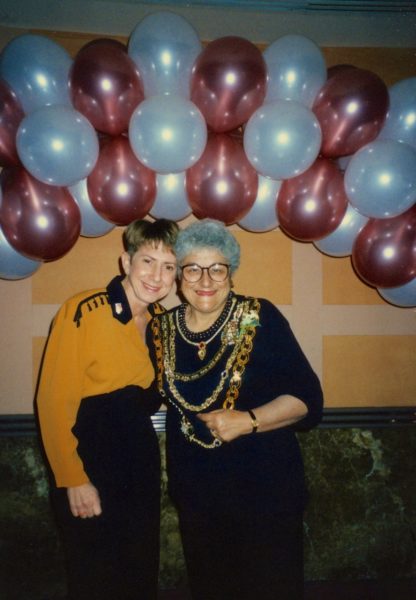
Despite the constant scrutiny and protests, Uribe and Rolf found other ways to help support for LGBT youth – including a prom where they could dress up and dance together and have fun like every other high school couple. And the Prom wasn’t just reserved for young people—oldsters who had been denied the experience got to come, too.
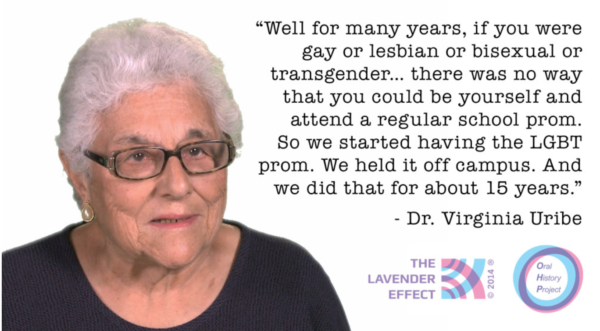
And by May 2009, Fairfax High School had its first male Prom Queen.
“I think that indicates where our society is right now. That the young people, they are not involved in this whole argument about gay rights. They think this whole fight is silly. They just accept people for who they are,” Uribe told The Times. “Gender-bending is just kind of in.”
Two years later, Lou Sheldon held a news conference in Santa Ana and only three people showed up—all of them from the progressive Courage Campaign.
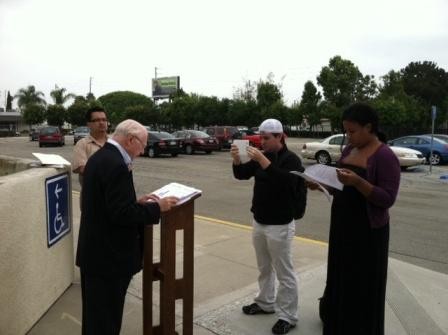
TVC is just a shadow of its former self, though it keeps its anti-LGBT light burning through this message on the website:
Matt. 18:6
“whoever causes one of these little ones who believe in Me to sin, it would be better for him if a millstone were hung around his neck, and he were drowned in the depth of the sea”
Nah, out science teacher and counselor Virginia Uribe might say. She is now with the many other LGBT pioneers who preceded her in death, including Jim Kepner, Harry Hay, Morris Kight, and Paul Monette. Jackie Goldberg, meanwhile, is running for LAUSD school board again. (Full disclosure: I’m in the photo at Morris and the group’s insistence.)
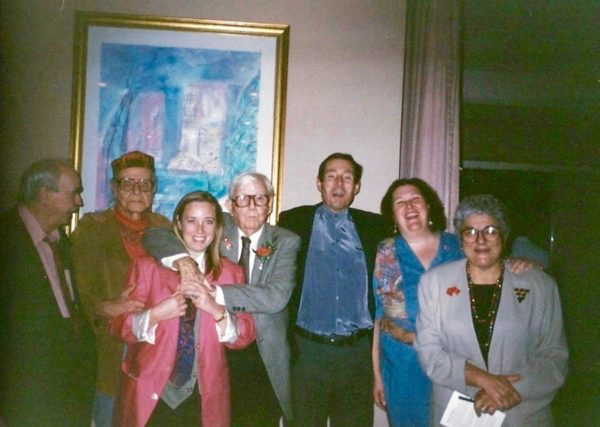
The Los Angeles LGBT Center assumed the responsibility of a Project 10 project—the annual Models of Pride conference. Center CEO Lorri L. Jean issued this statement on March 31:
“The entire Center community mourns the loss of Dr. Gina Uribe. As an educator, advocate, and activist, she devoted her life to helping nurture and protect LGBTQ youth. Believing every young person has the right to self-respect and dignity, Gina led the fight against anti-LGBTQ discrimination in our public schools for over half a century.
“Project 10, which she founded in 1984, was the nation’s first program to address anti-LGBTQ harassment in public schools and became a model for school districts throughout the country and around the world. As part of Project 10, she was instrumental in the development and growth of Models of Pride, now the world’s largest free conference for LGBTQ youth and allies presented by the Center.
“A true hero of the LGBTQ community, Gina’s legacy of fighting discrimination and her devotion to creating a world that embraces diversity and celebrates all of our children will surely live on in the countless lives she helped change for the better.”
Named in honor of Dr. Uribe and Gail Rolf—fellow educator and now Executive Director of Friends of Project 10—the Rolf/Uribe Leadership Award is presented annually during the Models of Pride conference to a youth and adult who have been models of pride to the LGBTQ community, showing extraordinary leadership and dedication to the rights of all people to live as full and equal members of society.
A scheduled fundraiser will go on for the Models of Excellence scholarship competition for Southern California senior high school students who have advanced LGBTQ civil rights. Sunday, April 28, 2019 from 2:00 PM to 5:00 PM PDT. Contact Gail Rolf, Education Director, Friends of Project 10 Inc. for more info: [email protected]
CORRECTION: A previous version said Dr. Uribe was 84. She was actually 85. My apologies.
homepage news
Honoring the legacy of New Orleans’ 1973 UpStairs Lounge fire
Why the arson attack that killed 32 gay men still resonates 50 years later

On June 23 of last year, I held the microphone as a gay man in the New Orleans City Council Chamber and related a lost piece of queer history to the seven council members. I told this story to disabuse all New Orleanians of the notion that silence and accommodation, in the face of institutional and official failures, are a path to healing.
The story I related to them began on a typical Sunday night at a second-story bar on the fringe of New Orleans’ French Quarter in 1973, where working-class men would gather around a white baby grand piano and belt out the lyrics to a song that was the anthem of their hidden community, “United We Stand” by the Brotherhood of Man.
“United we stand,” the men would sing together, “divided we fall” — the words epitomizing the ethos of their beloved UpStairs Lounge bar, an egalitarian free space that served as a forerunner to today’s queer safe havens.
Around that piano in the 1970s Deep South, gays and lesbians, white and Black queens, Christians and non-Christians, and even early gender minorities could cast aside the racism, sexism, and homophobia of the times to find acceptance and companionship for a moment.
For regulars, the UpStairs Lounge was a miracle, a small pocket of acceptance in a broader world where their very identities were illegal.
On the Sunday night of June 24, 1973, their voices were silenced in a murderous act of arson that claimed 32 lives and still stands as the deadliest fire in New Orleans history — and the worst mass killing of gays in 20th century America.
As 13 fire companies struggled to douse the inferno, police refused to question the chief suspect, even though gay witnesses identified and brought the soot-covered man to officers idly standing by. This suspect, an internally conflicted gay-for-pay sex worker named Rodger Dale Nunez, had been ejected from the UpStairs Lounge screaming the word “burn” minutes before, but New Orleans police rebuffed the testimony of fire survivors on the street and allowed Nunez to disappear.
As the fire raged, police denigrated the deceased to reporters on the street: “Some thieves hung out there, and you know this was a queer bar.”
For days afterward, the carnage met with official silence. With no local gay political leaders willing to step forward, national Gay Liberation-era figures like Rev. Troy Perry of the Metropolitan Community Church flew in to “help our bereaved brothers and sisters” — and shatter officialdom’s code of silence.
Perry broke local taboos by holding a press conference as an openly gay man. “It’s high time that you people, in New Orleans, Louisiana, got the message and joined the rest of the Union,” Perry said.
Two days later, on June 26, 1973, as families hesitated to step forward to identify their kin in the morgue, UpStairs Lounge owner Phil Esteve stood in his badly charred bar, the air still foul with death. He rebuffed attempts by Perry to turn the fire into a call for visibility and progress for homosexuals.
“This fire had very little to do with the gay movement or with anything gay,” Esteve told a reporter from The Philadelphia Inquirer. “I do not want my bar or this tragedy to be used to further any of their causes.”
Conspicuously, no photos of Esteve appeared in coverage of the UpStairs Lounge fire or its aftermath — and the bar owner also remained silent as he witnessed police looting the ashes of his business.
“Phil said the cash register, juke box, cigarette machine and some wallets had money removed,” recounted Esteve’s friend Bob McAnear, a former U.S. Customs officer. “Phil wouldn’t report it because, if he did, police would never allow him to operate a bar in New Orleans again.”
The next day, gay bar owners, incensed at declining gay bar traffic amid an atmosphere of anxiety, confronted Perry at a clandestine meeting. “How dare you hold your damn news conferences!” one business owner shouted.
Ignoring calls for gay self-censorship, Perry held a 250-person memorial for the fire victims the following Sunday, July 1, culminating in mourners defiantly marching out the front door of a French Quarter church into waiting news cameras. “Reverend Troy Perry awoke several sleeping giants, me being one of them,” recalled Charlene Schneider, a lesbian activist who walked out of that front door with Perry.

Esteve doubted the UpStairs Lounge story’s capacity to rouse gay political fervor. As the coroner buried four of his former patrons anonymously on the edge of town, Esteve quietly collected at least $25,000 in fire insurance proceeds. Less than a year later, he used the money to open another gay bar called the Post Office, where patrons of the UpStairs Lounge — some with visible burn scars — gathered but were discouraged from singing “United We Stand.”
New Orleans cops neglected to question the chief arson suspect and closed the investigation without answers in late August 1973. Gay elites in the city’s power structure began gaslighting the mourners who marched with Perry into the news cameras, casting suspicion on their memories and re-characterizing their moment of liberation as a stunt.
When a local gay journalist asked in April 1977, “Where are the gay activists in New Orleans?,” Esteve responded that there were none, because none were needed. “We don’t feel we’re discriminated against,” Esteve said. “New Orleans gays are different from gays anywhere else… Perhaps there is some correlation between the amount of gay activism in other cities and the degree of police harassment.”

An attitude of nihilism and disavowal descended upon the memory of the UpStairs Lounge victims, goaded by Esteve and fellow gay entrepreneurs who earned their keep via gay patrons drowning their sorrows each night instead of protesting the injustices that kept them drinking.
Into the 1980s, the story of the UpStairs Lounge all but vanished from conversation — with the exception of a few sanctuaries for gay political debate such as the local lesbian bar Charlene’s, run by the activist Charlene Schneider.
By 1988, the 15th anniversary of the fire, the UpStairs Lounge narrative comprised little more than a call for better fire codes and indoor sprinklers. UpStairs Lounge survivor Stewart Butler summed it up: “A tragedy that, as far as I know, no good came of.”
Finally, in 1991, at Stewart Butler and Charlene Schneider’s nudging, the UpStairs Lounge story became aligned with the crusade of liberated gays and lesbians seeking equal rights in Louisiana. The halls of power responded with intermittent progress. The New Orleans City Council, horrified by the story but not yet ready to take its look in the mirror, enacted an anti-discrimination ordinance protecting gays and lesbians in housing, employment, and public accommodations that Dec. 12 — more than 18 years after the fire.
“I believe the fire was the catalyst for the anger to bring us all to the table,” Schneider told The Times-Picayune, a tacit rebuke to Esteve’s strategy of silent accommodation. Even Esteve seemed to change his stance with time, granting a full interview with the first UpStairs Lounge scholar Johnny Townsend sometime around 1989.
Most of the figures in this historic tale are now deceased. What’s left is an enduring story that refused to go gently. The story now echoes around the world — a musical about the UpStairs Lounge fire recently played in Tokyo, translating the gay underworld of the 1973 French Quarter for Japanese audiences.
When I finished my presentation to the City Council last June, I looked up to see the seven council members in tears. Unanimously, they approved a resolution acknowledging the historic failures of city leaders in the wake of the UpStairs Lounge fire.
Council members personally apologized to UpStairs Lounge families and survivors seated in the chamber in a symbolic act that, though it could not bring back those who died, still mattered greatly to those whose pain had been denied, leaving them to grieve alone. At long last, official silence and indifference gave way to heartfelt words of healing.
The way Americans remember the past is an active, ongoing process. Our collective memory is malleable, but it matters because it speaks volumes about our maturity as a people, how we acknowledge the past’s influence in our lives, and how it shapes the examples we set for our youth. Do we grapple with difficult truths, or do we duck accountability by defaulting to nostalgia and bluster? Or worse, do we simply ignore the past until it fades into a black hole of ignorance and indifference?
I believe that a factual retelling of the UpStairs Lounge tragedy — and how, 50 years onward, it became known internationally — resonates beyond our current divides. It reminds queer and non-queer Americans that ignoring the past holds back the present, and that silence is no cure for what ails a participatory nation.
Silence isolates. Silence gaslights and shrouds. It preserves the power structures that scapegoat the disempowered.
Solidarity, on the other hand, unites. Solidarity illuminates a path forward together. Above all, solidarity transforms the downtrodden into a resounding chorus of citizens — in the spirit of voices who once gathered ‘round a white baby grand piano and sang, joyfully and loudly, “United We Stand.”

Robert W. Fieseler is a New Orleans-based journalist and the author of “Tinderbox: the Untold Story of the Up Stairs Lounge Fire and the Rise of Gay Liberation.”
homepage news
New Supreme Court term includes critical LGBTQ case with ‘terrifying’ consequences
Business owner seeks to decline services for same-sex weddings

The U.S. Supreme Court, after a decision overturning Roe v. Wade that still leaves many reeling, is starting a new term with justices slated to revisit the issue of LGBTQ rights.
In 303 Creative v. Elenis, the court will return to the issue of whether or not providers of custom-made goods can refuse service to LGBTQ customers on First Amendment grounds. In this case, the business owner is Lorie Smith, a website designer in Colorado who wants to opt out of providing her graphic design services for same-sex weddings despite the civil rights law in her state.
Jennifer Pizer, acting chief legal officer of Lambda Legal, said in an interview with the Blade, “it’s not too much to say an immeasurably huge amount is at stake” for LGBTQ people depending on the outcome of the case.
“This contrived idea that making custom goods, or offering a custom service, somehow tacitly conveys an endorsement of the person — if that were to be accepted, that would be a profound change in the law,” Pizer said. “And the stakes are very high because there are no practical, obvious, principled ways to limit that kind of an exception, and if the law isn’t clear in this regard, then the people who are at risk of experiencing discrimination have no security, no effective protection by having a non-discrimination laws, because at any moment, as one makes their way through the commercial marketplace, you don’t know whether a particular business person is going to refuse to serve you.”
The upcoming arguments and decision in the 303 Creative case mark a return to LGBTQ rights for the Supreme Court, which had no lawsuit to directly address the issue in its previous term, although many argued the Dobbs decision put LGBTQ rights in peril and threatened access to abortion for LGBTQ people.
And yet, the 303 Creative case is similar to other cases the Supreme Court has previously heard on the providers of services seeking the right to deny services based on First Amendment grounds, such as Masterpiece Cakeshop and Fulton v. City of Philadelphia. In both of those cases, however, the court issued narrow rulings on the facts of litigation, declining to issue sweeping rulings either upholding non-discrimination principles or First Amendment exemptions.
Pizer, who signed one of the friend-of-the-court briefs in opposition to 303 Creative, said the case is “similar in the goals” of the Masterpiece Cakeshop litigation on the basis they both seek exemptions to the same non-discrimination law that governs their business, the Colorado Anti-Discrimination Act, or CADA, and seek “to further the social and political argument that they should be free to refuse same-sex couples or LGBTQ people in particular.”
“So there’s the legal goal, and it connects to the social and political goals and in that sense, it’s the same as Masterpiece,” Pizer said. “And so there are multiple problems with it again, as a legal matter, but also as a social matter, because as with the religion argument, it flows from the idea that having something to do with us is endorsing us.”
One difference: the Masterpiece Cakeshop litigation stemmed from an act of refusal of service after owner, Jack Phillips, declined to make a custom-made wedding cake for a same-sex couple for their upcoming wedding. No act of discrimination in the past, however, is present in the 303 Creative case. The owner seeks to put on her website a disclaimer she won’t provide services for same-sex weddings, signaling an intent to discriminate against same-sex couples rather than having done so.
As such, expect issues of standing — whether or not either party is personally aggrieved and able bring to a lawsuit — to be hashed out in arguments as well as whether the litigation is ripe for review as justices consider the case. It’s not hard to see U.S. Chief Justice John Roberts, who has sought to lead the court to reach less sweeping decisions (sometimes successfully, and sometimes in the Dobbs case not successfully) to push for a decision along these lines.
Another key difference: The 303 Creative case hinges on the argument of freedom of speech as opposed to the two-fold argument of freedom of speech and freedom of religious exercise in the Masterpiece Cakeshop litigation. Although 303 Creative requested in its petition to the Supreme Court review of both issues of speech and religion, justices elected only to take up the issue of free speech in granting a writ of certiorari (or agreement to take up a case). Justices also declined to accept another question in the petition request of review of the 1990 precedent in Smith v. Employment Division, which concluded states can enforce neutral generally applicable laws on citizens with religious objections without violating the First Amendment.
Representing 303 Creative in the lawsuit is Alliance Defending Freedom, a law firm that has sought to undermine civil rights laws for LGBTQ people with litigation seeking exemptions based on the First Amendment, such as the Masterpiece Cakeshop case.
Kristen Waggoner, president of Alliance Defending Freedom, wrote in a Sept. 12 legal brief signed by her and other attorneys that a decision in favor of 303 Creative boils down to a clear-cut violation of the First Amendment.
“Colorado and the United States still contend that CADA only regulates sales transactions,” the brief says. “But their cases do not apply because they involve non-expressive activities: selling BBQ, firing employees, restricting school attendance, limiting club memberships, and providing room access. Colorado’s own cases agree that the government may not use public-accommodation laws to affect a commercial actor’s speech.”
Pizer, however, pushed back strongly on the idea a decision in favor of 303 Creative would be as focused as Alliance Defending Freedom purports it would be, arguing it could open the door to widespread discrimination against LGBTQ people.
“One way to put it is art tends to be in the eye of the beholder,” Pizer said. “Is something of a craft, or is it art? I feel like I’m channeling Lily Tomlin. Remember ‘soup and art’? We have had an understanding that whether something is beautiful or not is not the determining factor about whether something is protected as artistic expression. There’s a legal test that recognizes if this is speech, whose speech is it, whose message is it? Would anyone who was hearing the speech or seeing the message understand it to be the message of the customer or of the merchants or craftsmen or business person?”
Despite the implications in the case for LGBTQ rights, 303 Creative may have supporters among LGBTQ people who consider themselves proponents of free speech.
One joint friend-of-the-court brief before the Supreme Court, written by Dale Carpenter, a law professor at Southern Methodist University who’s written in favor of LGBTQ rights, and Eugene Volokh, a First Amendment legal scholar at the University of California, Los Angeles, argues the case is an opportunity to affirm the First Amendment applies to goods and services that are uniquely expressive.
“Distinguishing expressive from non-expressive products in some contexts might be hard, but the Tenth Circuit agreed that Smith’s product does not present a hard case,” the brief says. “Yet that court (and Colorado) declined to recognize any exemption for products constituting speech. The Tenth Circuit has effectively recognized a state interest in subjecting the creation of speech itself to antidiscrimination laws.”
Oral arguments in the case aren’t yet set, but may be announced soon. Set to defend the state of Colorado and enforcement of its non-discrimination law in the case is Colorado Solicitor General Eric Reuel Olson. Just this week, the U.S. Supreme Court announced it would grant the request to the U.S. solicitor general to present arguments before the justices on behalf of the Biden administration.
With a 6-3 conservative majority on the court that has recently scrapped the super-precedent guaranteeing the right to abortion, supporters of LGBTQ rights may think the outcome of the case is all but lost, especially amid widespread fears same-sex marriage would be next on the chopping block. After the U.S. Tenth Circuit Court of Appeals ruled against 303 Creative in the lawsuit, the simple action by the Supreme Court to grant review in the lawsuit suggests they are primed to issue a reversal and rule in favor of the company.
Pizer, acknowledging the call to action issued by LGBTQ groups in the aftermath of the Dobbs decision, conceded the current Supreme Court issuing the ruling in this case is “a terrifying prospect,” but cautioned the issue isn’t so much the makeup of the court but whether or not justices will continue down the path of abolishing case law.
“I think the question that we’re facing with respect to all of the cases or at least many of the cases that are in front of the court right now, is whether this court is going to continue on this radical sort of wrecking ball to the edifice of settled law and seemingly a goal of setting up whole new structures of what our basic legal principles are going to be. Are we going to have another term of that?” Pizer said. “And if so, that’s terrifying.”
homepage news
Kelley Robinson, a Black, queer woman, named president of Human Rights Campaign
Progressive activist a veteran of Planned Parenthood Action Fund

Kelley Robinson, a Black, queer woman and veteran of Planned Parenthood Action Fund, is to become the next president of the Human Rights Campaign, the nation’s leading LGBTQ group announced on Tuesday.
Robinson is set to become the ninth president of the Human Rights Campaign after having served as executive director of Planned Parenthood Action Fund and more than 12 years of experience as a leader in the progressive movement. She’ll be the first Black, queer woman to serve in that role.
“I’m honored and ready to lead HRC — and our more than three million member-advocates — as we continue working to achieve equality and liberation for all Lesbian, Gay, Bisexual, Transgender, and Queer people,” Robinson said. “This is a pivotal moment in our movement for equality for LGBTQ+ people. We, particularly our trans and BIPOC communities, are quite literally in the fight for our lives and facing unprecedented threats that seek to destroy us.”
The next Human Rights Campaign president is named as Democrats are performing well in polls in the mid-term elections after the U.S. Supreme Court overturned Roe v. Wade, leaving an opening for the LGBTQ group to play a key role amid fears LGBTQ rights are next on the chopping block.
“The overturning of Roe v. Wade reminds us we are just one Supreme Court decision away from losing fundamental freedoms including the freedom to marry, voting rights, and privacy,” Robinson said. “We are facing a generational opportunity to rise to these challenges and create real, sustainable change. I believe that working together this change is possible right now. This next chapter of the Human Rights Campaign is about getting to freedom and liberation without any exceptions — and today I am making a promise and commitment to carry this work forward.”
The Human Rights Campaign announces its next president after a nearly year-long search process after the board of directors terminated its former president Alphonso David when he was ensnared in the sexual misconduct scandal that led former New York Gov. Andrew Cuomo to resign. David has denied wrongdoing and filed a lawsuit against the LGBTQ group alleging racial discrimination.















